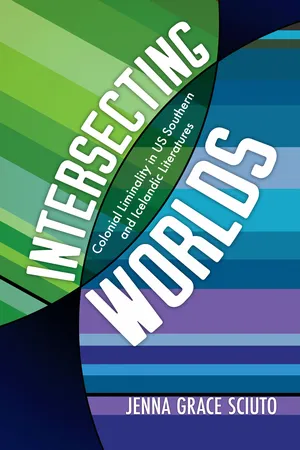
Intersecting Worlds
Colonial Liminality in US Southern and Icelandic Literatures
- English
- ePUB (mobile friendly)
- Available on iOS & Android
About this book
Intersecting Worlds: Colonial Liminality in US Southern and Icelandic Literatures recalibrates readings of US southern and American writers by exploring comparable depictions of race, colonialism, Whiteness, gender, and sexuality in Icelandic literature. This book explores the liminality, ambiguity, and general unease that result when postcolonial theories are applied to both Iceland and the US South. It investigates the parallels and also the limitations to such comparisons with the labels and binaries created to represent colonial dynamics flattening the complex positionings of Iceland and the US South. Iceland, an independent nation since 1944, has a complex colonial history. As a former dependency of Denmark that endured a US military presence from 1941 to 2006, Iceland's global positioning invites comparisons to formerly colonized spaces. At the same time, Iceland's history and geopolitical location differ from other colonized nations, which were subject to brutal violence and dehumanizing practices. This comparative project investigates Iceland's colonial liminality and draws connections to the colonial ambiguity of the US South, depicted as colonized by the federal government during Reconstruction and the site of the colonization of the Black population through slavery and its later iterations.Exploring the work of US southern writers, like William Faulkner, Gayl Jones, Jean Toomer, and Carson McCullers, alongside twentieth-century Icelandic novelists, including Halldór Laxness, Svava Jakobsdóttir, ?Guðbergur Bergsson, and Fríða Áslaug Sigurðardóttir, on both thematic and aesthetic levels reveals much about each region's history and the complexity of colonial dynamics. Intersecting Worlds centers layers of Whiteness in both national and transnational contexts, challenges ideas of Nordic and US southern exceptionalism, and exposes the complex impacts of colonialism in the Global North and the Global South, as depicted in twentieth-century literature.
Frequently asked questions
- Essential is ideal for learners and professionals who enjoy exploring a wide range of subjects. Access the Essential Library with 800,000+ trusted titles and best-sellers across business, personal growth, and the humanities. Includes unlimited reading time and Standard Read Aloud voice.
- Complete: Perfect for advanced learners and researchers needing full, unrestricted access. Unlock 1.4M+ books across hundreds of subjects, including academic and specialized titles. The Complete Plan also includes advanced features like Premium Read Aloud and Research Assistant.
Please note we cannot support devices running on iOS 13 and Android 7 or earlier. Learn more about using the app.
Information
Table of contents
- Cover
- Title Page
- Copyright
- Dedication
- Contents
- Acknowledgments
- A Note on Working in Translation
- Introduction: Liminal Colonial Worlds
- Chapter 1: Delimiting Difference: Language, Stereotypes, and Repetition in Halldór Laxness,William Faulkner, and Svava Jakobsdóttir
- Chapter 2: Aesthetic Radicals: White Violence as Exclusion in Guðbergur Bergsson,William Faulkner, and Jean Toomer
- Chapter 3: “I’m Sick of Being a Girl!”: Nonconformity and Intersecting Hierarchies of Identity in Halldór Laxness and Carson McCullers
- Chapter 4: “A Woman’s Wildness”: Power, Magic, and Intergenerational Ties in Tiphanie Yanique and Fríða Áslaug Sigurðardóttir
- Coda: Processing the Present, Looking to a Decolonial Future
- Notes
- Works Cited
- Index
- About the Author